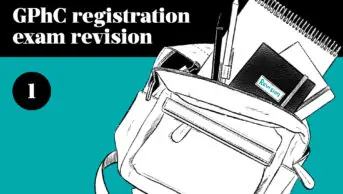
General Pharmaceutical Council
More than 600 pharmacy inspections by the General Pharmaceutical Council (GPhC) resulted in a ‘poor’ rating over the past five years, a freedom-of-information (FOI) request has revealed.
Responding to a request from the Pharmacists’ Defence Association (PDA), the pharmacy regulator said it had rated 667 pharmacies as ‘poor’ between November 2013 and June 2018, and that 2,576 inspections resulted in an action plan being required to improve the pharmacy’s performance. Some of these may have been repeat inspections.
‘Poor’ pharmacies are asked to submit an improvement action plan within 10 working days, and ‘satisfactory’ pharmacies must do this within 20 days.
The PDA, which supports the needs of individual pharmacists and pharmacy students, said a previous FOI response from the GPhC, provided in November 2017, revealed that the regulator had not issued any sanctions against a pharmacy owner or superintendent for a breach of its pharmacy premises safety standards.
The PDA said the GPhC’s treatment of pharmacy owners was “in stark contrast with their treatment of individual registrants” and that a previous FOI request had revealed that since it was established, the GPhC had issued 4,111 sanctions to individual registrants.
Alima Batchelor, head of policy at the PDA, questioned whether the problems the GPhC encountered could “always be the fault of individuals working on the front line, and never the fault of the organisation, or because of the policy set by the employer?”.
Batchelor added that the PDA would like to see the GPhC “take a stronger, more modern ‘systems’ approach to patient safety, as used in other industries, to protect the public.
“That includes significantly strengthening its approach to regulating registered pharmacies — and whilst we’re generally supportive of the proposals in its current consultation, they do not go nearly far enough,” she said.
Responding to the report, Duncan Rudkin, chief executive of the GPhC, said ratings of pharmacies should not be compared with fitness to practise investigations.
“It’s important to note that there are different legal frameworks for the regulation of pharmacy professionals and pharmacies so that comparison doesn’t provide much insight,” he said.
Rudkin said legislation introduced in May 2018 had given the GPhC “strengthened powers” to regulate registered pharmacies, including new powers to publish inspection reports and a range of enforcement tools.
Rudkin added that the GPhC was consulting on its proposed approach to regulating registered pharmacies, including a new model of inspection that would enable it to be more “responsive to intelligence and to issues within pharmacy”.
You may also be interested in

Pharmacy regulator considers giving up legal authority to conduct covert investigations of pharmacists

More than 40% of people with ADHD waiting at least two years to access mental health service, study finds
